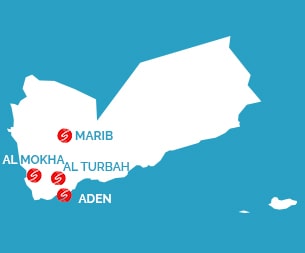
Context
Despite short-term ceasefires, fighting continued, resulting in renewed population displacements and more destruction. Over 4 million Yemenis have been displaced.
The continuing civil war has also brought economic hardship. The country has serious structural weaknesses and its basic services and infrastructure (water supplies, sanitation and health in particular) have been damaged by the fighting. The population is in an extremely vulnerable situation, and many communities are suffering from critical food insecurity. Yemen is also prone to natural disasters, such as flooding, and climate shocks. This heightens humanitarian needs, which are already extensive due to structural problems.
- 32.98 million inhabitants
- 183rd out of 191 countries on the Human Development Index
Our action

-
Mission
opened in 2017 -
Team
14 international staff
135 national staff - Budget 11.72M€
Our teams have stepped up their emergency response in Marib governorate. This region provides refuge for around two million people who were displaced by the conflict during 2022.
In areas affected by water scarcity, SOLIDARITÉS INTERNATIONAL has expanded its programs to increase the capacity and resilience of communities and local authorities with regard to water, sanitation and hygiene management. A pilot project using innovative approaches has enabled a map of underground water sources to be produced, in collaboration with local authorities and communities. This map will soon enable water to be used more efficiently.
Institutional and private funding partners ECHO, CDCS, Dutch Ministry of Foreign Affairs, SDC, BHA, CIAA, OCHA Pooled Fund for Yemen (YHF)
Operating partners IMC, CCY (DRC, Acted, NRC, Mercy Corps)
Our impact

Providing a rapid multi-sectoral response to shocks
- Water transportation using water tankers
- Emergency latrines, emergency shelters, basic necessity kits
- Prevention and WASH response to cholera
- Cash transfers and food aid

Providing populations affected by the protracted crisis with decent living conditions
- Rehabilitation of water points
- Household latrines
- Hygiene kits and hygiene promotion
- WASH activities in health centers and schools

Rebuilding and strengthening the resilience of communities affected by the conflict
- Restoring livelihoods in rural areas
- Sustainable water supplies in urban and rural areas
- Hygiene promotion
- Rehabilitation of urban sanitation systems
Should you have any questions, please contact Thomas Janny.

In the world
Vacancies
At head office
Worldwide
Internships
